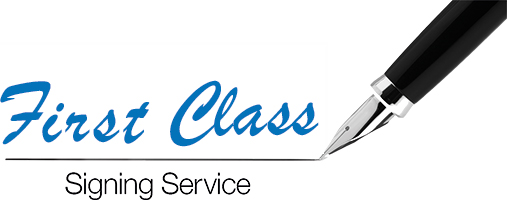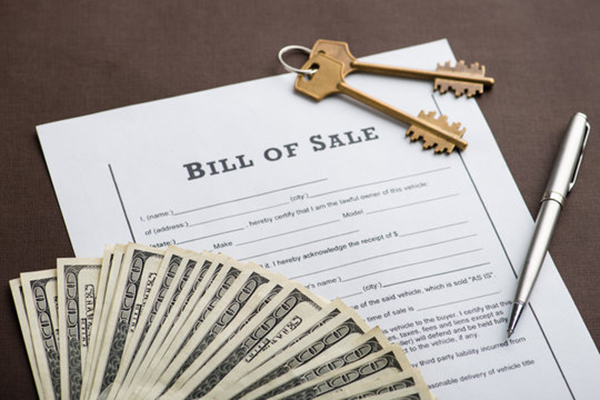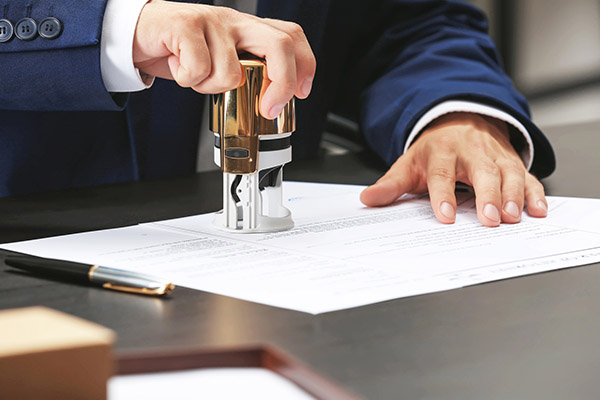When you buy or sell something valuable like a car, boat or firearm, having the right paperwork matters. A bill of sale records the details of that transaction, serving as proof of ownership transfer between two parties. But many people wonder: Is a bill of sale valid without a notary? The answer depends on where you live and what type of item is being sold.
At First Class Signing, we help individuals and businesses across the country handle notarizations quickly and securely. Whether you need a bill of sale notarized or want to confirm if it’s legally required, our certified notaries can guide you through the process and ensure your paperwork meets all state requirements.
What Is a Bill of Sale?
A bill of sale is a legal document confirming that ownership of an asset has been transferred from one person to another. It’s like an official receipt that lists the buyer, seller, date, item description and sale amount. These documents are commonly used for cars, boats, firearms and other valuable property.
To make a bill of sale legally valid, it should include:
- Full names and contact details of buyer and seller
- Date of the transaction
- Detailed description of the item (like a VIN or serial number)
- Sale price and payment terms
- Signatures from both parties
Notarization is not always required, but it strengthens the document’s authenticity and can prevent future disputes.
When Is Notarization Required?
While many states accept a non-notarized bill of sale, certain transactions do require notarization:
- Vehicle Sales: Some states, such as Louisiana, Montana, Nebraska, Maryland, New Hampshire and West Virginia, require vehicle bills of sale to be notarized before a title transfer can occur.
- Boat Sales: States that register watercraft often require notarized bills of sale to verify ownership transfer and prevent fraud.
- Firearm Sales: In some jurisdictions, a notarized firearm bill of sale is needed to confirm both parties’ identities and ensure the transaction complies with local laws.
Even in states where notarization isn’t mandatory, many buyers and sellers still choose to notarize their documents for added protection.
Benefits of Notarizing a Bill of Sale
Getting your bill of sale notarized provides several advantages:
- Prevents Fraud: The notary confirms everyone’s identity, reducing the risk of impersonation or forgery.
- Creates a Verified Record: A notarized document carries greater legal weight if ownership is ever questioned.
- Protects Both Parties: It provides impartial confirmation that both parties willingly agreed to the terms.
- Simplifies Dispute Resolution: If disagreements arise, a notarized bill of sale is reliable proof in court.
What Happens If You Skip Notarization?
If your state requires notarization and you skip it, your bill of sale might be considered invalid, delaying title transfers or registration. Even in states that don’t require notarization, a non-notarized document can carry less weight in disputes. Without official verification, one party could challenge the sale’s legitimacy, leaving you vulnerable to complications.
How To Get a Bill of Sale Notarized
Notarizing a bill of sale is simple with First Class Signing Service. Here’s how it works:
- Prepare Your Document: Fill out all details, but don’t sign it yet. Both parties should be ready to present valid government-issued ID.
- Schedule a Notary: Choose a mobile notary to meet you in person, or request Remote Online Notarization (RON) for added convenience.
- Verification: The notary will confirm identities and witness the signing.
- Seal and Return: Once verified, the notary adds their official stamp, completing the process.
Whether you prefer meeting in person or notarizing online, our team ensures your bill of sale is handled securely, accurately and on time.
Common Red Flags and Best Practices
- Never sign before the notary verifies your identity.
- Avoid using expired or temporary IDs.
- Make sure all sections of the bill of sale are filled out before notarization.
- Confirm the notary’s credentials and ensure they’re authorized in your state.
- Keep copies of the notarized document for your records.
Frequently Asked Questions
Q: Does a handwritten bill of sale need to be notarized?
A: A handwritten bill of sale is legally valid as long as it includes required details, but notarization may still be needed depending on state laws.
Q: Can I notarize a bill of sale after it’s already signed?
A: No. All signers must appear before the notary to verify identity and witness the signing in real time.
Q: Do both buyer and seller need to be present?
A: In most cases, yes. Both parties must sign in the notary’s presence unless local law allows alternative arrangements.
Q: How much does it cost to notarize a bill of sale?
A: Fees vary by state, but most notaries charge a small, state-regulated amount per signature.
Q: Where can I find my state’s requirements?
A: Check your state’s motor vehicle or public records website for current notarization rules.
Notary Needed?
So, does a bill of sale need to be notarized? The answer depends on the type of sale and your state’s laws. Even when it’s not required, notarization offers peace of mind and protection for both parties. It verifies the transaction, deters fraud and ensures the document holds up if questions arise later.
For a fast, secure and professional notarization experience, schedule a mobile notary with First Class Signing today and complete your transaction with confidence.
Need a Signing Today?
First Class Signing Service’s home office is in Livermore, California, but we pride ourselves on delivering all-in signing solutions to clients nationwide, covering all 50 states and four U.S. territories.
What sets us apart is our exceptional team of 50,000-plus highly qualified signing agents who are dedicated to providing reliable and efficient signing services with utmost care and professionalism.





